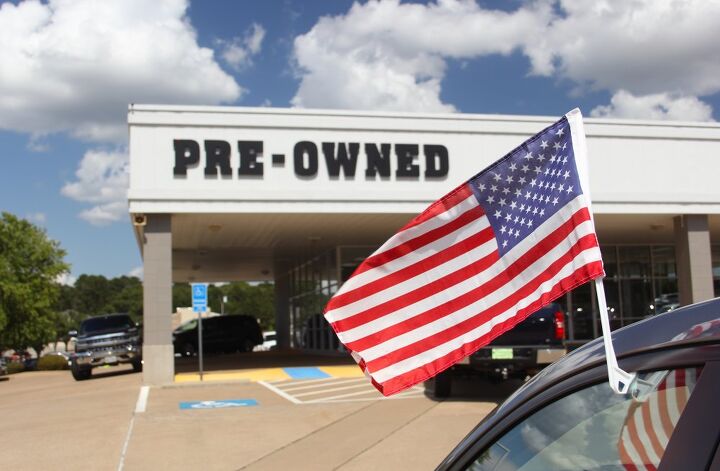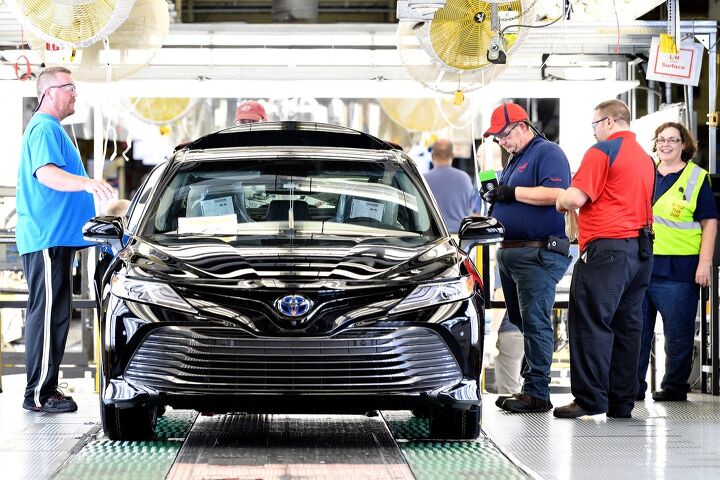#AutoMarket
Insane Survey Claims Most People Would Pay $19,000 Over MSRP
With vehicle prices surging over the last two years, the age of negotiating a price below sticker seems to have ended. Manufacturers are raising their rates to cope with inflation. But they’ve also noticed how much abuse they’ve been willing to endure via dealer markups. You rarely hear someone talking about how much they saved on their new car anymore. Now, the topic of interest is how much financial abuse you managed to avoid before driving it off the lot.
Report: Wholesale Used Car Prices Are Coming Down, Don't Get Too Excited
If you’ve started hoarding auto parts in the event that future car prices fail to stabilize, leaving you indefinitely maintaining whatever heap is currently in your garage, there’s some good news incoming. Used vehicle prices have begun to fall, even if they’ve not yet reached the kind of valuations we might actually consider reasonable.
Chinese Auto Market Still Sour, Dealers Discount Old Stock
Automotive retail sales in China rose slightly last month, representing the first uptick in volume over the last year, according to Bloomberg. But those gains were the result of a nationwide fire sale of backed-up inventory that dealers were tired of seeing clutter up their lots. Officially, the China Association of Automobile Manufacturers (CAAM) says the new vehicle market still kind of sucks.
For June, wholesale deliveries of new passenger vehicles fell 7.8 percent to 1.73 million units. That’s twelve straight months of negative growth.
An Exhaustive List of Everything Automakers Want You to Know About Trump's Import Investigation (Hint: Higher Prices, Fewer Jobs)
It’s no secret that the automotive industry has come out universally against the Trump administration’s proposal to increase import tariffs. Numerous manufacturers weighed in independently on the issue as trade groups rise in opposition to the U.S. Commerce Department’s national security investigation.
The industry’s claim that imported vehicles don’t pose a risk to the wellbeing of the United States seems to have fallen on deaf ears. Threats that the prospective import duties on parts could result in fewer, more-expensive automobiles being produced domestically have been heard — and rebuked — by President Trump.
“What’s really going to happen is there’s going to be no tax,” he told Fox News in a weekend broadcast. “You know why? They’re going to build their cars in America. They’re going to make them here.”
However, automakers, parts suppliers, and even local governments have submitted comments to the Commerce Department ahead of the hearings scheduled for July 19th — and they’re all incredibly negative.
Trade War Watch: China to Reduce Import Tariffs for Cars and Components
China has announced plans to slash import fees on automobiles to 15 percent starting this July. While the tariff currently rides high at 25 percent, the country’s Ministry of Finance said reducing it was part of an intentional effort to open up China’s markets and spur development within the local automotive sector.
It may also have been part of a peace offering. President Donald Trump has been pretty clear on China’s trade policies with the United States, frequently referring to them as unfair. The U.S. imposes a svelte 2.5 percent fee on imported vehicles — unless we’re talking about trucks. “Does that sound like free or fair trade?” Trump tweeted last month. “No, it sounds like STUPID TRADE — going on for years!”
China Plans to Open Car Market By 2022
After weeks of unpleasant trade talk and posturing between Washington and Beijing, China’s lead economic planner announced the country would be easing limits on foreign ownership of automotive ventures. While an official metric was not posted, it will be less than the current 50-percent cap non-Chinese automakers have been limited to since 1994. But, for all we know, China may be seeking to scrap the mandate entirely.
We did, however, get a timeline. On Tuesday, the People’s Republic announced it would remove foreign ownership caps for companies making fully electric and plug-in hybrid vehicles this year — followed by commercial vehicle manufacturers in 2020 and the rest of the car market by 2022.
QOTD: If The Auto Industry Could Build Only One Car, What Should It Be?
Which car models need to die immediately, TTAC asked two days ago.
What if they all died, all of them except one? Which one, individual, solitary new vehicle should be left behind to cater to the demands of every new car buyer in the world?
It will have to be a vehicle that perfectly balances an immensely broad range of requirements. This universal car has to be affordable, but let’s not pretend the Dacia Logan is up to the standards of Beverly Hills, let alone Dubai. It will have to be sufficiently environmentally sensitive to get past regulations in green-conscious markets, but can a Toyota Prius Prime fill the void left by a Mercedes-AMG GLS63? A two-seater surely won’t do, but a nine-seat Chevrolet Suburban is probably too large if every Amsterdammer trades in their bicycle. And if we don’t demand more than 250 horsepower, do enthusiasts get to have input?
If you could have just one car, and if your neighbor and all their neighbors and every global citizen had access to the very same vehicle, what should The Universal Car be?
QOTD: Which Car Models Need to Die Immediately?
Today’s marketplace is a crowded affair. Each manufacturer seems to sit down at the table every new model year with more. More variants, more things with all-wheel drive, more CUVs, and more vehicles which split the pieces of the sales pie down to ever smaller fragments. This fragmentation leads to the eye splinter above, whatever the hell Toyota thinks it is, which will clog up parking lots everywhere starting next year.
To cure this portion issue, I think some models need to die, and I want you to help me choose which ones.























Recent Comments